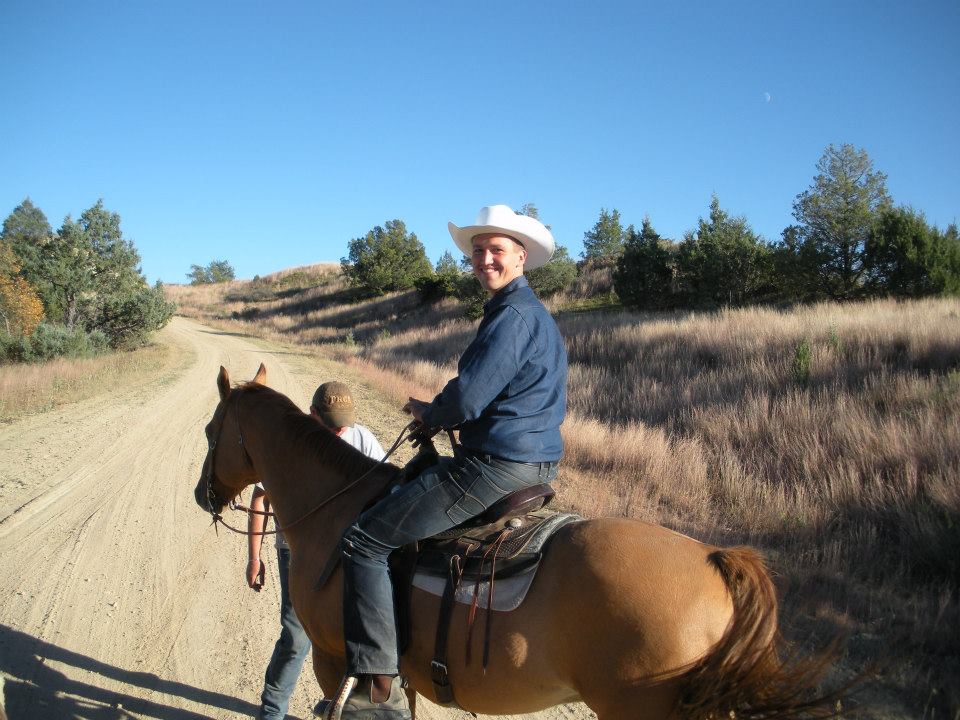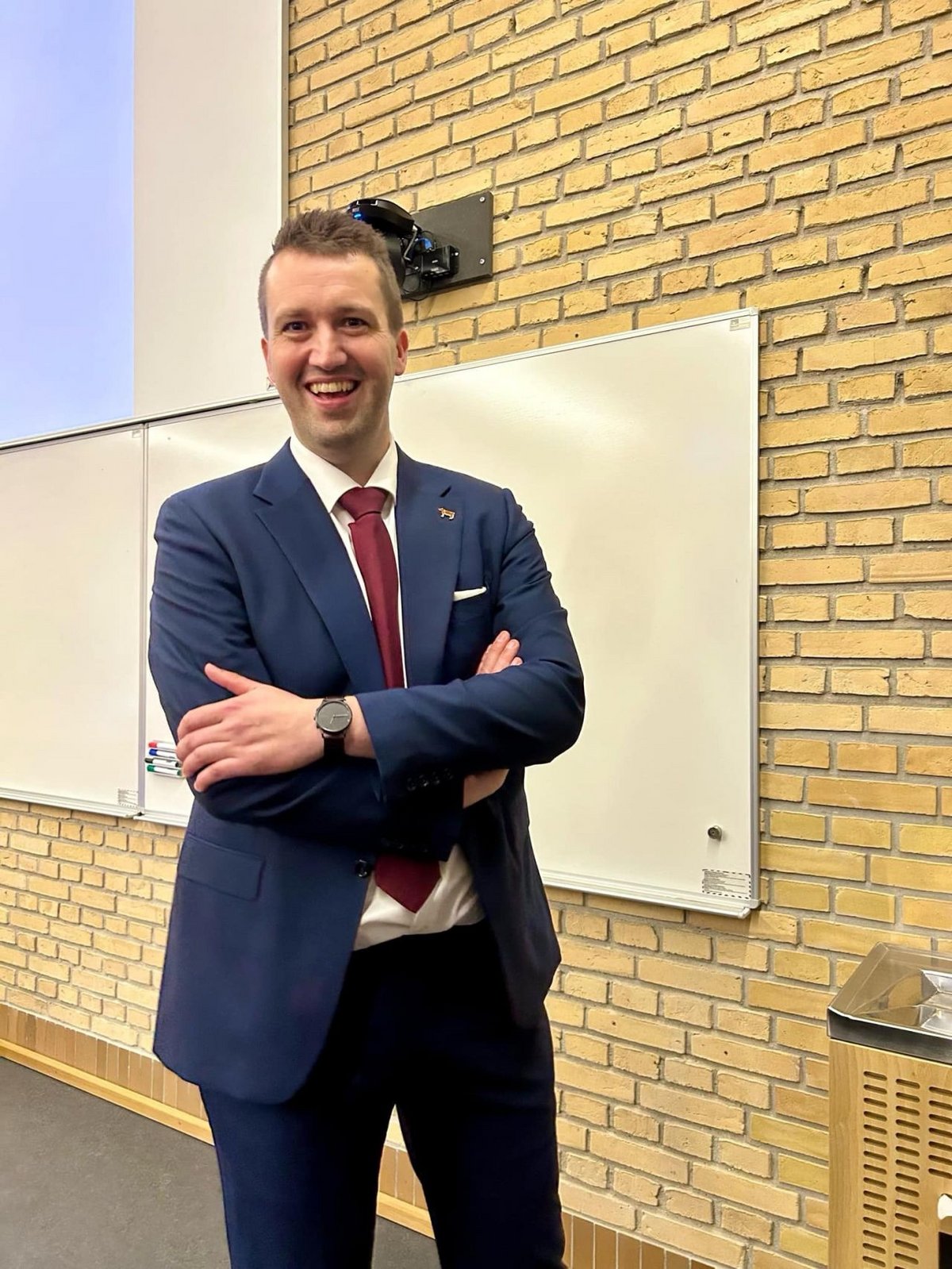Former Farmer, Now Researcher, Connects Two Worlds
Originally trained as a farmer, Rasmus Bak Stephansen traded in the barn for a laboratory when given the chance. Now, he hopes to bridge the gap between the agricultural sector and research institutions.

West of Lemvig is a dairy farm with around 300 cows. Cows that need to be fed, milked, and cared for every day.
Here, among the hay, large animals, and the sweet smell of milk and manure, Rasmus Bak Stephansen spent his childhood – and he loved it. Life in the barn, in the fields, and on the vast expanses was a wonderful place for a child, he says.
Throughout his childhood he couldn't imagine that one day, he would move away. That he wouldn’t become a farmer like his father and take care of the cows and produce the milk that most of us drink.
But things didn't quite turn out the way he imagined.

Whilst studying to become a farmer, he discovered that he was good at the more academic stuff. His teachers even encouraged him to continue his education. But he was not sure what he wanted.
- When I was studying, my teachers encouraged me to continue my education after I became a farmer. At first, I was in doubt, but I decided to continue studying.
- Throughout my childhood, I always imagined that I would end up using my hands for work. That I would do something practical, but instead, I ended up using my mathematical skills.
This week, Rasmus defended his PhD thesis at the Center for Quantitative Genetics and Genomics at Aarhus University. He’s now a postdoc, and the plan is to continue his research. But, as he points out, still with both his feet firmly planted in the agricultural soil of Western Jutland.
- My brother has taken over the farm back home and several of my old friends also work in agriculture. A couple of them run companies renting out farming equipment, another a pig farm, and a third a plant-based farm. Therefore I am very aware of how the world looks from the farmers' perspective, he says.
Rasmus Bak Stephansen
Born and raised on a farm west of Lemvig.
Trained as a farmer with a specialization in cattle. Has also worked a year in the US as a cowboy on a ranch.
Rasmus subsequently obtained a master's degree in agrobiology and has recently defended his PhD at the Center for Quantitative Genetics and Genomics. Here, he has researched how we can breed cows that are better at utilizing the feed they receive.
Rasmus will continue his research as a postdoc at the same place after his PhD.
First in his family to attend university
In Rasmus' family, there's no tradition of attending university. He's the first to attend, and it’s sometimes difficult for his family to understand what his work is about, he explains.
- I'm from a family of farmers, masons and other types of artisans. When I talk about my work, I'm met with a certain amount of skepticism. But it's coming from a good place, he says, continuing:
- Once, my brother and I were visiting an acquaintance on his farm, and he asked what skills I acquired during my master's degree from university. Maybe I hesitated a bit too long. Anyway, my brother cut in and said that I was able to cover an even bigger pile of sugar beets, which everyone found very funny.
Despite the fact that Rasmus is doing his best to explain what his research is about, it may seem a bit far removed from his family's everyday life. And he understands that. The everyday life of a researcher is very different from the practical life in the countryside.
- When my immediate family has a difficulty in understanding how I work, it's no wonder that farmers and researchers often misunderstand each other. Farmers find it difficult to relate to what researchers do – and think it's far removed from reality. And we as researchers may not always understand the challenges of a farmer’s everyday live.
- I fundamentally believe that it's a lack of knowledge and willingness to understand each other that leads to this polarization between farmers and researchers. And I hope that with my feet firmly planted in both worlds, I can bridge this gap.

Searching for more sustainable cows
Even though Rasmus no longer works in the barn milking cows, he hasn't lost his interest in the cows. His research focuses on how we can breed better and more sustainable dairy cattle.
- For a hundred years, we've been selecting the cows that produce the most milk while at the same time being the healthiest. We've had a big focus on milk yield. I'm looking into breeding cows that are betting at utilizing their feed.
- The idea is that in the future, we are able to breed cows that eat less and therefore have a smaller climate impact, but at the same time produce the same amount of milk. Not only is that good for the climate, it also benefits the farmers’ economy.
The question is how to identify these cows.
Rasmus has gained access to a large amount of genetic data from dairy cows on experimental farms worldwide. Specifically, from the Holstein breed.
He has also used data from the Danish company Viking Genetics, which sets up 3D cameras in barns to monitor how much each individual cow actually eats and compares it to the animal's genetic profile. By analyzing the data, he has identified which cows to select in order to breed cows that are better at utilizing feed.
- We know that about 10-15 percent of the variation in how efficiently the cows absorb feed comes from their genes. So there's a lot of untapped potential, he says.
There is a need for more people with different experiences and backgrounds to attend university and do research. I am sure that this will make research more diverse and ultimately stronger.
- Rasmus Bak Stephansen
A long and winding road
Because Rasmus initially trained as a farmer and later earned a more practically oriented bachelor's degree, his path to a research career has been longer than most. At one point, he was about to give up.
- After my bachelor's degree, I wanted to enroll in the master's program in Agrobiology, but at the time, there was no direct entry for students with degrees from outside the university. After a long tug-of-war, I was admitted, but I had to take supplementary courses in statistics and biochemistry, he says.
Rasmus was the first to enter the program this way, and he hopes he has paved the way for others.
- Since I was admitted, a closer collaboration has been established between Business Academy Aarhus and AU Viborg, where the university's programs in plant- and animal science is located. From what I've heard, a more formal path has been established.
- There is a need for more people with different experiences and backgrounds to attend university and do research. I am sure that this will make research more diverse and ultimately stronger.
Contact info
Rasmus Bak Stephansen
Postdoc
Center for Quantitative Genetics and Genomics
Email: rasmus.stephansen@qgg.au.dk
Jeppe Kyhne Knudsen
Journalist and science communicator
Faculty of Technical Sciences at Aarhus Universitet
Email: jkk@au.dk
Phone: +45 93 50 81 48
